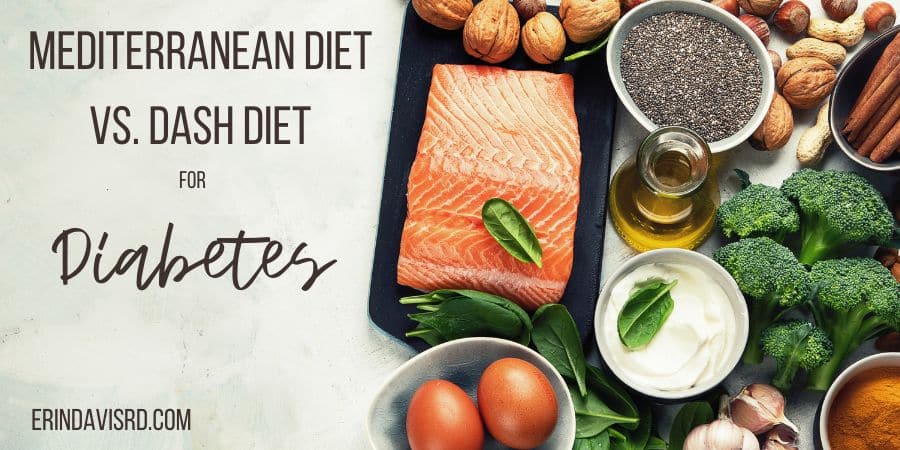You know that diet is important when you have diabetes. You’re trying to nail down the best diet to lower your blood sugars. There’s a lot of buzz around both the DASH and Mediterranean diet. Is there one that’s better for people with diabetes? In today’s post, I’m discussing the Mediterranean diet vs. the DASH diet for diabetes management.
One of my top-performing posts is about the carnivore diet and diabetes. People want to know what diet is best for diabetes.
And for good reason. Diet has an obvious and immediate effect on your blood sugars.
The Mediterranean and DASH (Dietary Approaches to Stop Hypertension) are two of the most studied diet patterns.
If you have a health condition, chances are, one of these diets can help improve your outcomes.
So which one is better? And as an anti-diet dietitian, do I recommend either one?
Below, I’ve done the research and share my thoughts about the Mediterranean diet vs. DASH diet. I’m also showing you how you can incorporate those foods to help manage your blood sugars.
Let’s dig in!
Disclaimer: Some of the links are affiliate links, meaning I may earn a small commission should you click on the link and purchase the recommended item. Thank you for your support!
Mediterranean diet

The Mediterranean diet is a way of eating named after the region that inspired this eating pattern. Those in southern Italy, Spain, and Crete were observed to have good health and longevity.
The traditional diet of those in the Mediterranean region included an emphasis on healthy fats, fruits, and vegetables. There’s also a moderate amount of seafood, dairy, eggs, and poultry consumed. Additionally, red meat is eaten on occasion.
There isn’t a certain number of calories, points, or macros you are aiming for when you follow the Mediterranean diet. You just mimic the pattern of those who are from that region and eat the following foods.
Mediterranean foods list

Here are the foods included in the Mediterranean diet:
- Vegetables and lots of them (every meal)
- Fruits (every meal)
- Whole grains (every meal)
- Healthy fats like olive oil, avocado (every meal)
- Legumes (at least 3x/week)
- Nuts and seeds (at least 3x/week)
- Fish every week
- Chicken, eggs, and low-fat dairy once a day
- Wine in a moderate amount (1 serving per day for women, 2 for men)
- Red meat, sweets, or other highly processed foods are limited to once per week
Mediterranean diet benefits

The Mediterranean diet has been the focus of SO MANY studies. The benefits of following the Mediterranean diet pattern cannot be denied.
- Heart health: Improving heart health has been one of the proven benefits of the Mediterranean diet. When compared to a low-fat diet, the Mediterranean diet was better at preventing heart attacks and strokes. It also improves the survival rates of those who have been diagnosed with heart disease.
- Cancer: While more research is needed, this 2023 review found that data shows promise for the Mediterranean diet lowering the risk of developing cancer, and may improve the health of cancer survivors. Likewise, this review showed that the Mediterranean diet has a protective effect against breast cancer.
- Cognitive health: Another pro to following the Mediterranean diet pattern is improved brain health and reduced risk of age-related decline and Alzheimer’s disease. Diets rich in omega-3 fatty acids and plant compounds are anti-inflammatory and protect your brain as you age.
- Gut health: Those who follow the Mediterranean diet tend to have favorable changes in their gut bacteria. These benefits are thought to come from the increased dietary fiber and omega-3 fatty acids in the diet.
Overall, it sounds pretty promising. Next, I want to look at how the Mediterranean diet specifically impacts diabetes.
Mediterranean diet for diabetes prevention

First, the Mediterranean diet has been shown to decrease risk of developing type 2 diabetes by nearly 20%.
This is without weight loss, calorie restriction, or exercise. This is a big deal.
So many of my clients are just told to cut carbs or lose weight. Easier said than done.
By adjusting your meals to look more like those on the Mediterranean diet pattern, you can effectively reduce your risk of developing diabetes.
But what if you already have diabetes? The Mediterranean diet may help.
Mediterranean diet for diabetes

We know diet affects your blood sugars. Most people are aware of that. It can be a challenge to get your blood sugar down.
I’ve had clients try fasting and counting calories or macros to lower their A1c. But it’s hard to stick to restrictive diets long-term.
Are there better diets than others when it comes to diabetes management?
In those with type 2 diabetes, the Mediterranean diet has been shown to reduce inflammation, improve insulin sensitivity, lower A1c, and improve cardiovascular risk.
In another study looking at the impact of fatty acids on glucose levels, it was found that intake of olive oil was associated with lower fasting blood glucose.
The benefits aren’t limited to those with type 2 diabetes. It’s been found that a higher intake of omega-3 fatty acids and plant compounds improve blood glucose control in type 1 diabetes also.
The same study linked the Mediterranean diet with the prevention of type 1 diabetes, the delay of its progression, as well as complication prevention.
DASH diet

Another popular diet with a ton of supporting research is the DASH diet. It originated in the ’90s by the NIH (National Institute of Health) as a way to combat hypertension.
Like the Mediterranean diet, it is considered more of a pattern than a prescriptive diet.
DASH diet foods

Here are the foods you eat when following the DASH diet:
- Vegetables: Aim for 5 servings daily
- Fruits: Around 5 servings daily
- Whole grains (oats, cracked wheat, millet, quinoa, etc.) and legumes (chickpeas, black beans, lentils, etc.): Get about 7 servings every day
- Low-fat dairy (milk, yogurt, and cheese): Around 2 servings per day
- Lean meat (chicken, lean pork, turkey) and eggs: Limit to 2 or fewer servings daily
- Nuts and seeds (almonds, walnuts, sunflower seeds, etc.): Aim for 2-3 times per week
- Poly- and mono-unsaturated fats like olive oil, avocado, and fish: in moderation
In addition to these foods, you limit processed meats like deli meat or jerky, margarine and shortening, added sugars, and ultra-processed foods.
DASH diet benefits

Dietary Approaches to Stop Hypertension does just that…and more! Here’s what the research says:
- Lower blood pressure: When compared to a control group (no diet), the participants following the DASH diet reduced their systolic and diastolic (top and bottom) blood pressure by 3.2 mmHg and 2.5 mmHg, respectively.
- Heart failure: Plant-based diets, such as the DASH diet tend to protect against heart failure and preserve heart function.
- Cognitive health: Because of its emphasis on fruits, veggies, and healthy fats, the DASH diet is linked to a lower risk of dementia and brain-related aging.
- Migraines: Suffer debilitating headaches? Another benefit to the DASH diet is the reduction of migraine frequency, duration, and severity.
While most of the research on the DASH diet has been centered on its cardiovascular benefits, there has been some data to support the DASH diet for diabetes.
DASH diet for diabetes

As you would expect, the majority of the DASH diet-specific research is about its ability to reduce hypertension or blood pressure.
But the qualities of the DASH diet pattern are similar to other plant-based diets that have been proven effective at managing diabetes.
As for specific research regarding the DASH diet and diabetes, I’ve found the following.
The DASH diet has its benefits for those with diabetes, including the reduction of type 2 diabetes development.
Following the DASH diet can also improve weight and blood glucose levels.
Mediterranean diet vs. DASH diet for diabetes

Both of these diets result in improved blood glucose levels and overall health outcomes.
But is there one better than the other? Well, in this study, the Mediterranean diet had a more significant reduction of A1c.
However, from a real-life standpoint, the diets are pretty similar. And there is no one-size-fits-all diet for diabetes.
The bottom line is there is a real benefit to focusing on vegetables, fruits, and healthy fats.
Increase nutrient-dense food intake
Emphasizing nonstarchy veggies, whole foods, and reducing processed foods is encouraged by the American Diabetes Association as well.
Adding these foods is a good place to start. Rather than cutting carbs and starving yourself, eat a veggie with every meal.
This kale blueberry salad is one of my favorite ways to get in veggies, fruits, and healthy fats.
Crave sweets after you eat? End your meal with a piece of dark chocolate.
Snack on fruit and nuts in the afternoon. Swap out your vegetable oil for olive oil. Replace one of your red meat meals with fish or legumes.
Shopping for pasta or rice? Choose whole wheat pasta and brown rice instead of the white varieties. Get the whole grain bread.
No counting. No starving. No food-obsessions.
As you make these changes, you’ll notice you’ll crave the processed stuff less and less. Especially if you don’t deem those foods as off-limits.
When you honor your hunger with nutrient-dense foods, your body is getting exactly what it needs. Health does not need to be restrictive.
Do you need help figuring out how to balance your diet while healing your relationship with food? You’re not alone. I’m here for you. Book a discovery call to see if my services align with your health goals.
References
- Andreo-López MC, Contreras-Bolívar V, Muñoz-Torres M, García-Fontana B, García-Fontana C. Influence of the Mediterranean Diet on Healthy Aging. Int J Mol Sci. 2023;24(5):4491. Published 2023 Feb 24. doi:10.3390/ijms24054491
- Delgado-Lista J, Alcala-Diaz JF, Torres-Peña JD, et al. Long-term secondary prevention of cardiovascular disease with a Mediterranean diet and a low-fat diet (CORDIOPREV): a randomised controlled trial. Lancet. 2022;399(10338):1876-1885. doi:10.1016/S0140-6736(22)00122-2
- Laffond A, Rivera-Picón C, Rodríguez-Muñoz PM, et al. Mediterranean Diet for Primary and Secondary Prevention of Cardiovascular Disease and Mortality: An Updated Systematic Review. Nutrients. 2023;15(15):3356. Published 2023 Jul 28. doi:10.3390/nu15153356
- Monllor-Tormos A, García-Vigara A, Morgan O, et al. Mediterranean diet for cancer prevention and survivorship. Maturitas. 2023;178:107841. doi:10.1016/j.maturitas.2023.107841
- González-Palacios Torres C, Barrios-Rodríguez R, Muñoz-Bravo C, Toledo E, Dierssen T, Jiménez-Moleón JJ. Mediterranean diet and risk of breast cancer: An umbrella review. Clin Nutr. 2023;42(4):600-608. doi:10.1016/j.clnu.2023.02.012
- Román GC, Jackson RE, Gadhia R, Román AN, Reis J. Mediterranean diet: The role of long-chain ω-3 fatty acids in fish; polyphenols in fruits, vegetables, cereals, coffee, tea, cacao and wine; probiotics and vitamins in prevention of stroke, age-related cognitive decline, and Alzheimer disease. Rev Neurol (Paris). 2019;175(10):724-741. doi:10.1016/j.neurol.2019.08.005
- Barber TM, Kabisch S, Pfeiffer AFH, Weickert MO. The Effects of the Mediterranean Diet on Health and Gut Microbiota. Nutrients. 2023;15(9):2150. Published 2023 Apr 29. doi:10.3390/nu15092150
- Koloverou E, Esposito K, Giugliano D, Panagiotakos D. The effect of Mediterranean diet on the development of type 2 diabetes mellitus: a meta-analysis of 10 prospective studies and 136,846 participants. Metabolism. 2014;63(7):903-911. doi:10.1016/j.metabol.2014.04.010
- Schwingshackl L, Missbach B, König J, Hoffmann G. Adherence to a Mediterranean diet and risk of diabetes: a systematic review and meta-analysis. Public Health Nutr. 2015;18(7):1292-1299. doi:10.1017/S1368980014001542
- Martín-Peláez S, Fito M, Castaner O. Mediterranean Diet Effects on Type 2 Diabetes Prevention, Disease Progression, and Related Mechanisms. A Review. Nutrients. 2020;12(8):2236. Published 2020 Jul 27. doi:10.3390/nu12082236
- Tierney AC, Roche HM. The potential role of olive oil-derived MUFA in insulin sensitivity. Mol Nutr Food Res. 2007;51(10):1235-1248. doi:10.1002/mnfr.200700143
- Calabrese CM, Valentini A, Calabrese G. Gut Microbiota and Type 1 Diabetes Mellitus: The Effect of Mediterranean Diet. Front Nutr. 2021;7:612773. Published 2021 Jan 13. doi:10.3389/fnut.2020.612773
- Wickman BE, Enkhmaa B, Ridberg R, et al. Dietary Management of Heart Failure: DASH Diet and Precision Nutrition Perspectives. Nutrients. 2021;13(12):4424. Published 2021 Dec 10. doi:10.3390/nu13124424
- Puri S, Shaheen M, Grover B. Nutrition and cognitive health: A life course approach. Front Public Health. 2023;11:1023907. Published 2023 Mar 27. doi:10.3389/fpubh.2023.1023907
- Gazerani P. Diet and migraine: what is proven?. Curr Opin Neurol. 2023;36(6):615-621. doi:10.1097/WCO.0000000000001204
- Rooholahzadegan F, Arefhosseini S, Tutunchi H, Badali T, Khoshbaten M, Ebrahimi-Mameghani M. The effect of DASH diet on glycemic response, meta-inflammation and serum LPS in obese patients with NAFLD: a double-blind controlled randomized clinical trial. Nutr Metab (Lond). 2023;20(1):11. Published 2023 Feb 14. doi:10.1186/s12986-023-00733-4
- Nowlin SY, Hammer MJ, D’Eramo Melkus G. Diet, inflammation, and glycemic control in type 2 diabetes: an integrative review of the literature. J Nutr Metab. 2012;2012:542698. doi:10.1155/2012/542698
Disclaimer: This information is intended as a self-help tool for your own use, at your own risk. My opinions do not reflect the values, thoughts, or opinions of the Academy of Nutrition and Dietetics or other professional health organizations.
About the author
Erin is a registered dietitian and diabetes educator with almost 20 years of experience. She specializes in weight-inclusive diabetes care and prevention, intuitive eating, fitness, and women’s health. She works as a consultant and writer in the health and wellness space. Erin is passionate about empowering people to manage their own health and to have peace with food.


